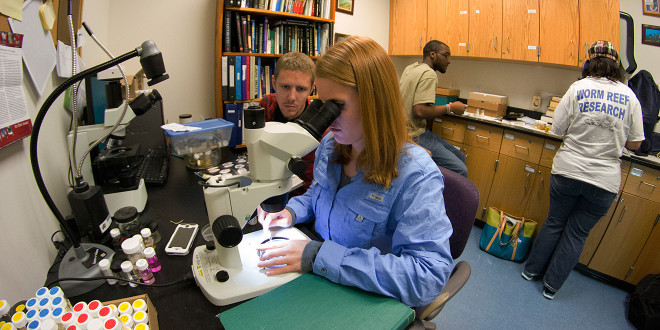Dr. Rose Borkowski is studying wild bottlenose dolphins, particularly those using interior areas of the St. Johns River near downtown Jacksonville. She also works to understand causes of death of small cetaceans in the Southeast. This project has involved dozens of Marine Science 101 students who participate in Dolphin Watch research using JU’s docks.
Kimberly Mann, a graduate student with MSRI Executive Director Dr. Quinton White, is studying oyster changes in Sisters Creek, Clapboard Creek and Pumpkin Hill Creek. She is also probing the use of oyster larvae to replenish oyster reefs in the area. The research is critical to efforts to restore a viable oyster harvesting operation in Northeast Florida.
Dr. Andy Ouellette and undergraduate biology major Rhea Derke are investigating toxic cyanobacterial blooms recurring in the St. Johns River. Along with Dr. Lucy Sonnenberg they will also look at levels of nitrogen and phosphorous associated with these blooms, with the data used to understand seasonal dynamics and environmental factors that contribute to the growth and toxin production of blooms in the river.
Justina Dacey, a JU graduate student with Dr. Jeremy Stalker, is doing research on groundwater and surface water interactions in the St. Johns River basin. The information will provide insight into aquifer structure and water-use management. Groundwater systems could be a significant source of nutrient loading, which can be a widespread threat to freshwater and coastal ecosystems worldwide.
Madelyn Woods, a JU graduate student with Dr. Dan McCarthy, is investigating plankton communities in the lower St. Johns River estuary. Like many estuaries, the Lower St. Johns River is threatened by habitat destruction, fishing pressures and nutrient overloading. The data will be used to assess seasonal plankton community patterns and harmful algal bloom.
Ivana Espinosa, a graduate student with Dr. Jeremy Stalker, is using stable isotopes to determine bottlenose dolphinsʼ foraging habits and migration in Northeast Florida. Stable isotopes will be analyzed from the teeth of deceased local bottlenose dolphins, helping identify diet and movement patterns.
 Wave Magazine Online Jacksonville University News Hub
Wave Magazine Online Jacksonville University News Hub
